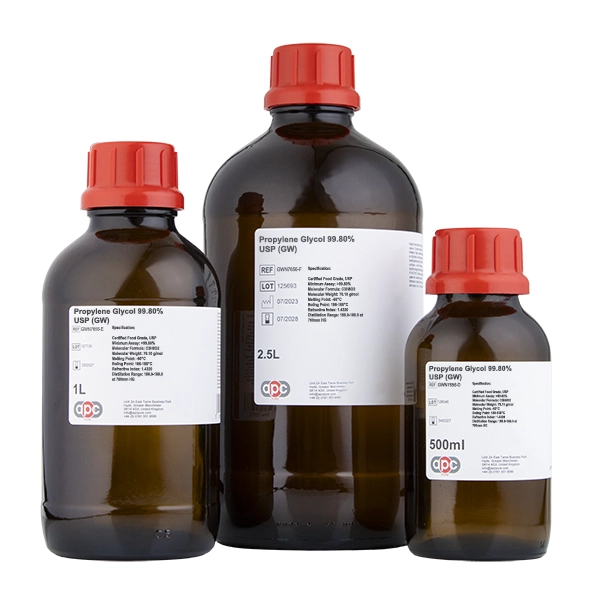Propylene Glycol 99.80% USP (GW)

£13.23 to £42.34
To see other pack sizes, select from drop down
| Variation ID | Pack Size | List Price | Qty | ||
|---|---|---|---|---|---|
| photo_camera | 500ml
GWN7656-D |
£13.23 | |||
| photo_camera | 1L
GWN7656-E |
£21.17 | |||
| photo_camera | 2.5L
GWN7656-F |
£42.34 |
What is Propylene Glycol? It is a viscous, colourless liquid. It is almost odourless and has a faintly sweet taste. Its chemical formula is C3H8O2. As it contains two alcohol groups, it is classified as a diol. An aliphatic diol may also be called a glycol. It is miscible with a broad range of solvents, including water, acetone, and chloroform. In general, glycols are non-irritating and have very low volatility.
Consistent Quality: We provide only high-quality Propylene Glycol 99.80%, meeting the standards of USP, ensuring reliable and consistent performance for all applications.
Shipped from Manchester, UK Facility: Sourced and bottled in non-toxic, chemical-resistant containers to ensure safe handling and preserve product quality during transport.
Glass Winchester Bottle: Available in 500ml, 1L and 2.5L pack sizes. Our Glass Winchester bottles can store chemicals that may be sensitive to light due to filtering potentially harmful UV rays. Bottles are durable, versatile and perfect for storing products in the chemical, pharmaceutical and cosmetic industries.
Frequent Uses
Polymerisation
Forty-five percent of propylene glycol produced is used as a chemical feedstock for the production of unsaturated polyester resins. In this regard, propylene glycol reacts with a mixture of unsaturated maleic anhydride and isophthalic acid to give a copolymer. This partially unsaturated polymer undergoes further crosslinking to yield thermoset plastics. Related to this application, propylene glycol reacts with propylene oxide to give oligomers and polymers that are used to produce polyurethanes.
Paints
Propylene glycol is used in water-based acrylic architectural paints to extend dry time which it accomplishes by preventing the surface from drying due to its slower evaporation rate compared to water.
Food manufacturing
In regulated amounts, propylene glycol is designated as safe for food manufacturing as an anticaking agent, emulsifier, flavor agent, humectant, texturiser, stabiliser, solvent, antioxidant, antimicrobial agent, and thickener.
Antifreeze
Propylene glycol is frequently used as a substitute for ethylene glycol in low toxicity, environmentally friendly automotive antifreeze. It is also used to winterise the plumbing systems in vacant structures.
Ecigs
Propylene glycol, vegetable glycerin, or a mixture of both, are the main ingredients in e-liquid used in electronic cigarettes. They are aerosolised to resemble smoke and serve as carriers for substances such as nicotine and flavourants.
- Ecigs
- Hand Sanitisers
- Medicines
- Food Colourings
- Cosmetics
- Shampoo
Certified Food Grade, USP
Minimum Assay: >99.80%
Molecular Formula: C3H8O2
Molecular Weight: 76.10 g/mol
Melting Point: -60°C
Boling Point: 186-188°C
Refractive Index: 1.4320
Distillation Range: 186.0-189.0 at 760mm HG
Cas Number: 57-55-6
Einecs Number: 200-338-0
HS Code / Commodity Code: 29053200
Hazard Phrases: H0001




